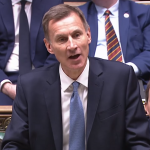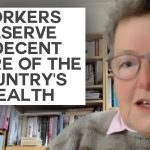These secretive organisations need overhauling to enable post-covid recovery

When we talk about what is needed to recover from lockdown on Green New Deal principles, we also need to talk about the institutions that are currently positioning to drive the recovery. One such set of institutions is the “Local Economic Partnerships” or LEPs – a network of 38 bodies that receive and distribute billions of pounds of public money across England to “drive economic growth”, but which totally lack oversight and democratic accountability.
Barely anyone, even people who are active or have an interest in politics, knows about the LEPs. Yet between 2015 and 2019, they received £9.1bn in central government funding for “local growth projects”, and in addition had a direct say in how £5.3bn of European structural and investment funds were spent in England. Set up by the Coalition Government in 2010, since 2012 they have grown in influence to the point where they set the economy, transport, infrastructure and energy strategies for every region in England. It is often LEPs who drive the agenda of road-building over public transport (for example, when I went to meet the Chief Executive of the New Anglia LEP, which covers Norfolk and Suffolk, he had posters on his wall proudly celebrating the ecologically disastrous “Northern Distributor Route” which cost Norfolk councils over £200m and has caused massive environmental damage).
And they are extremely secretive. LEP board meetings are held in secret, at undisclosed locations, with no public questions allowed. It was only after a critical report from the National Audit Office that LEPs began publicly publishing information about the business and infrastructure projects that they fund and about the salaries they pay. Even though local authorities have nominal involvement, most LEP boards only include representatives from selected councils. For example, the Lancashire LEP has only 5 local councillors on its board, despite Lancashire being made up of 15 different local councils. Many LEPs cover huge areas – for example, the South-East LEP covers East Sussex, Kent, and Essex, so can barely claim to be “local”. And still only 27% of LEP board members are women.
If the LEPs fail to be locally representative, they also have a dangerously narrow agenda for what counts as enterprise – which has implication for the economy both during and post-lockdown. Because of their conventional approach to what is considered economically beneficial – ie: growth, growth, growth, and the profit incentive – they tend to favour big business, at the expense of other forms of enterprise. That means not only small businesses (what are known as SMEs), but also community interest companies (CICs), social enterprises, cooperatives and not-for-profits. The covid crisis is demonstrating how successful hyper-local and cooperative forms of enterprise can be, and we need to be supporting them so that that energy can continue into a post-lockdown world, but with the might of the LEPs behind big business, that will be hard.
An example is agriculture and food production. The covid crisis, especially in its early stages, showed how vulnerable our food system is, especially for the most vulnerable. Our current food system is reliant on imports, industrial agriculture, just-in-time delivery, and large-scale retail, all of which involve big businesses driven by profit. By contrast, a more localised and community-based food system can be more resilient. Where I am, in Norwich, local independent and community food producers have come together in a mutual aid model to help deliver food both to those who can afford to pay them and to those who can’t. It is a community that is entrepreneurial in the best sense, but they will not receive any support from the LEP.
The LEPs are doing some good work. For example, the New Anglia LEP has identified and is coordinating over 220 suppliers of PPE, and they have been working on training programmes to skill up workers for the renewables industry. We as activists have to engage with the LEPs because they have the power and the influence right now to set in motion the restructuring of the economy to a lower-carbon one. But we also have to be building the alternatives: the local, democratic, not-for-profit institutions and organisations that will be essential to planning and delivering a post-covid and post-carbon society.
PS. Bright Green has big plans for the future, but we need your input. Take 2 minutes to see what we’re planning and tell us your thoughts.




So true. I’ve been following the work of the South East LEP for several years. They love big ticket projects, particularly roads and what they laughingly call ‘enterprise parks’- that is, give our local ‘regeneration’ company millions, they’ll destroy a load of green space to build such a park, they’ll fail to find any tenants, then they’ll move on to the next one. Over and over again, with absolutely no accountability.